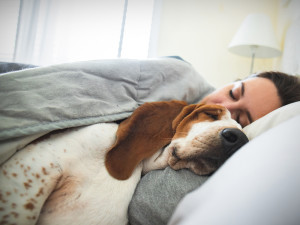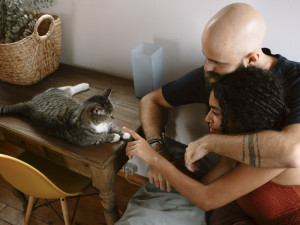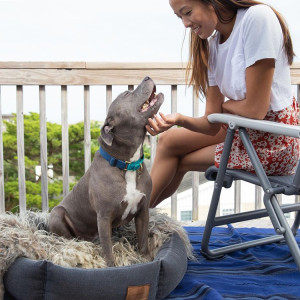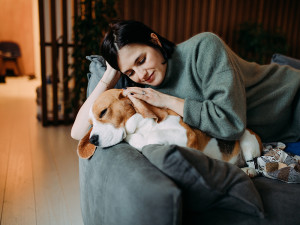What Are the Effects of Sleeping With Your Dog in Bed?
There are pros and cons of sleeping with your dog — for both of you.
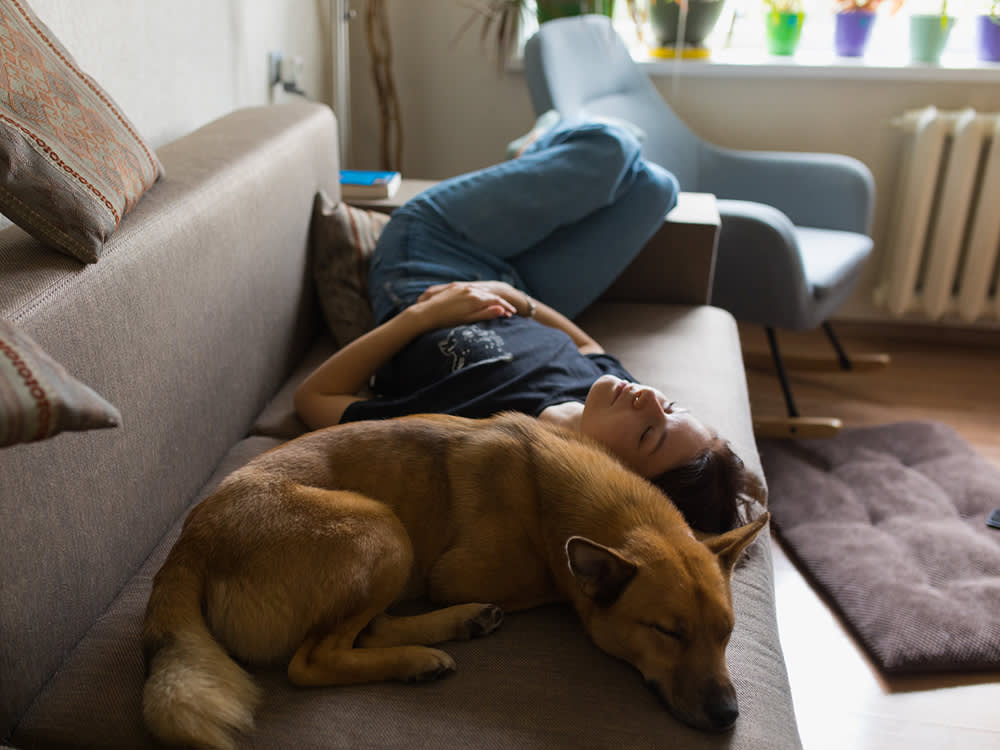
share article

Your pet wants you to read our newsletter. (Then give them a treat.)
Watching dogs sleep — limbs akimbo, eyebrows twitching, paws paddling in a dreamland chase — is one of the joys of living with them. Another is the coziness of sharing your bed with them. Many people share a bed with their dogs, whether for emotional comfort, warmth (the expression “three-dog night” has real meaning!), or because the bed is their go-to spot. Yet, while it makes people happy, you might wonder if it’s something you should actually be doing.
One concern relates to old-school ideas about dominanceopens in a new tab. For many years, people were told that allowing your dogs on the bed with you would interfere with your attempts to dominate them, which was supposedly essential to having a well-trained dog. The entire concept of dominance related to our dogs has been out of favor for many years in the canine world, and rightfully so.
Reputable trainers and behaviorists spend a lot of time in the course of their work explaining to people why this paradigm of dominance is destructive to the relationship, not helpful. And while shame about sleeping with dogs is far less common than it was a decade or two ago, a lot of people still fear being judged on the nighttime canine company they keep. That’s too bad, because many of the effects of sleeping with your dog are so incredibly positive.
Should you let your dog sleep with you?
Sharing a bed with your dog is a choice, and in so many cases, it’s a darn good choice! There are so many benefits to spending the night together, whether you are next to each other under the cover, or the dog is by your feet. If the benefits are too irresistible to, well, resist, and any downsides are worth tolerating, then the answer to “Should you let your dog sleep with you?” is a solid “Yes!”
Benefits to sharing the bed with dogs:
Most dogs like to sleep with us, whether that means sleeping right next to us, sleeping close to us or even sleeping on top of us. Proximity can also alert us to any problems our dogs may have, such as itchy skin, bad dreams, or general restlessness. The number of people who want to know why dogs like to sleep next to us or why dogs want to sleep on us is far higher than anyone who doesn’t work with dog behavior daily would ever guess. It seems to make them feel connected, which is a big benefit to them. A quick way to sum up the effects of sleeping with your dog is that it’s good for your body and good for your soul.
1. Feeling safer.
The extra security of being close to their people reduces the stress some dogs experience in response to noise, whether it’s simple car sounds or intense opens in a new tab. Similarly, many people feel more secure with their dog next to them.
2. Feeling warmer.
In a cold world, it really is nice to have a dog sleeping in the bed. Their body heat makes sleeping cozier and easier when it’s cold out. And hey, the money saved on heating bills can go right toward dog toys and special treats, which makes it a win-win all around.
3. Bonding with your dog
Physical contact makes us feel emotionally closer to our dogs. The oxytocin produced by touching and when we gaze into each other’s eyes produces the same kind of close bond mothers share with their babies. That’s a powerful connection, and building it with your dog is a very special, biological miracle.
4. Improved health and wellbeing.
Petting your dog, as you are sure to do when on the bed together, lowers blood pressure and enhances overall health and well-being. The calm state induces relaxation and may allow you to get more rest each night. Better rest, a calmer state, and lower blood pressure are all good for your health, so having your dog sleeping in the bed is just responsible self-care.
Problems when dogs share the bed:
1. Fighting within couples.
People may have very different views on the subject; couples have been known to fight like, well, cats and dogs about it. If you and your partner don’t agree on welcoming a dog to your shared bed, the conflict could harm your relationship. That tension may also affect the relationship between the person who wants a dog-free bed and the dog who senses they are not welcome. Having a dog as a bed buddy can be marvelous if everyone is happy with the arrangement and everyone is sleeping well, but that’s not always the case. If the dog sleeping in your bed is ruining the relationship, that is a major drawback of the practice.
2. Changes in sleep quality.
A dog on the bed may have an impact on the quality of your sleep. A few studies have looked at how having a dog on the bed affects human sleep, with mixed results. A 2017 studyopens in a new tab investigated sleep efficiency (the percentage of time spent in bed actually sleeping) with a dog on the bed and with a dog in the room but not on the bed; the test group was made up of healthy, middle-aged women. The results? “On the bed” had a sleep-efficiency score of 80 percent, while “in the room” clocked in at 83 percent. That’s a small difference, and both figures are considered satisfactory by sleep experts.
In another studyopens in a new tab, more than 40 percent of people who sleep with their dogs reported that their dog did not disrupt their sleep; some said they even improved it. Warmth, contentment and relaxation were cited as sources of these positive co-sleeping evaluations. In the absence of a partner — either because they were single or their partner was away from home — many people said that having their dog on the bed with them gave them a wonderful sense of companionship. Only 20 percent of participants reported that their dogs disrupted their sleep.
3. Increased allergies or asthma
Many people with asthma or allergies report that they suffer more from these conditions if their dog is on the bed with them or even in the same room with them at night. To manage any medical conditions that are exacerbated by being in close proximity to your dog for extended periods, it’s a good idea to consult with your physician and follow their advice. In some cases, there may be steps you can take to minimize the negative effects on your health, whether that involves sleeping with your dog less often, having a little more distance between you and your dog, or direct medical intervention. Following the advice from your doctor is the best way to take care of your health.
Should I consult my veterinarian before letting my dog sleep with me?
Health is too important to take any risks about it, a concept that is relevant to both you and your dog. The link between sleeping with your dog and any possible health concerns for you or your best friend is a subject that requires consultation with medical professionals. Most people have two questions about health and sharing a bed with your dog, and the answers to both are to ask medical professionals.
If you wonder, “Should I consult my veterinarian before letting my dog sleep with me?”, my answer is that this is an excellent idea. And the answer to the question, “Can I allow my dog to sleep on my bed if I have certain health conditions?” is similar: Ask your doctor about the wisdom of sleeping with your dog given your particular medical condition.
Does sleeping with your dog cause separation anxiety?
There is no evidence that sleeping with your dog will cause separation anxiety. This myth continues to pop up for predictable reasons. Dogs with separation anxiety are likely to be dogs who want to be as close to you as possible, even at night. So, dogs with separation anxiety are likely to try to sleep in the bed with you. That does not mean that the co-sleeping is the cause of any separation distress.
Sleep can affect dogs’ learning and memory.
It’s well known that going to sleep after studying helps people consolidate new information and leads to its storage in long-term memory. In another example of the many parallels between canine and human brains, the same is true for dogs: sleeping is an important part of their learning process, so if being in the bed with you is where they want to sleep and where they sleep best, you are helping them learn and remember.
In aHungarian studyopens in a new tab, researchers taught dogs to respond to the cues “sit” and “lie down” in English, which—because they were trained in a different language—were new to them. After their training session, the dogs napped, and researchers found that during these naps, the dogs exhibited the same sleep-wave patterns associated with sleep-dependent memory consolidation in other species.
Specific bursts of brain activity, called sleep spindles, occur during non-REM sleep and are related to learning and memory. Sleep spindle density predicts overnight memory consolidation in people and in rats. According to data from this study, the same is true for dogs. Dogs who had a greater density of sleep spindles following a training session had better recall when tested on their response to the new cues later. Additionally, like female humans, female dogs had more sleep spindles as well as better retention of the new skills when compared to their male counterparts.
Dogs don’t sleep as well at night if they have a bad experience during the day.
It’s easy to relate to recent research showing that dogs’ sleep suffers if they have negative experiences during the day—the same thing is true for people. This study compared the sleep of dogs who had a positive experience (being petted or playing an enjoyable game) and those who had a negative experience (being tied to a door and left alone or having a stranger come in and stare at them without saying anything). Dogs who had the negative experiences fell asleep faster, but the quality of their sleep was not as good. They spent less time in deep sleep and more time in REM sleep. If a dog has a bad day, a night of poor sleep is a real possibility, as is the dog’s tiredness and irritability the following day. Sleeping with your dog may help them cope with these challenges, or possibly alert you to their restless sleep so you know they are struggling or perhaps had a bad experience that day.
Dogs’ Sleeping Positions
Dog sleeping positions are epically weird, and wildly varied. Social media sites are full of posts of dogs sleeping in curious contortions. Some dogs look like they are straight out of a Dali painting as they fold and bend from furniture onto the floor in the oddest ways. Others are upside down, twisted, or sprawled in ways that don’t seem orthopedically possible. Whenever I see a post about dog sleeping positions, there are always many pictures shared of dogs in a position matching the original post, no matter how unusual the posture.
If your vet has no concerns about the position in which your dog sleeps, you are one of many people who are dealing with a case of just letting dogs be dogs, no matter how much the way they sleep makes you shake your head. One little-considered effect of sleeping with your dog is the opportunity to experience these postures up close, and that’s the kind of good fun that adds to the joy of sharing your life with dogs.
Dogs love to be near people, people love to be near dogs, and sharing a bed makes most dogs and people feel safe, cozy, loved and warm (at least until the dog steals the covers!) It’s great that there’s been a surge of interest in canine sleep in recent years. Paying attention to your dog’s sleep can influence your relationship with them, their quality of life and their happiness. Yes, sleep is that important.
References

Karen B. London, PhD, CAAB, CPDT-KA
Karen B. London, Ph.D., is a Certified Applied Animal Behaviorist and Certified Professional Dog Trainer who specializes in working with dogs with serious behavioral issues, including aggression, and has also trained other animals including cats, birds, snakes, and insects. She writes the animal column for the Arizona Daily Sun and is an Adjunct Professor in the Department of Biological Sciences at Northern Arizona University. She is the author of six books about training and behavior, including her most recent, Treat Everyone Like a Dog: How a Dog Trainer’s World View Can Improve Your Lifeopens in a new tab.
Related articles
![Shiba inu dog sleeping in bed]() opens in a new tab
opens in a new tabMy Dog Sleeps All Day—Is That Normal?
Dogs need more sleep than humans. Here’s how much is healthy.
![A dog laying on a couch peacefully.]() opens in a new tab
opens in a new tabI’m Not Lazy...
If hypothyroidism is to blame, it’s best not to let sleeping dogs lie.
![A couple smiling at their cat]() opens in a new tab
opens in a new tabLet’s Talk About Pets, Baby
We asked The Wildest readers hard-hitting relationship questions, and here’s what we learned.
![a human petting a dog on a dog bed]() opens in a new tab
opens in a new tab16 Best Dog Beds Recommended By Experts
Our dogs sleep with us, too. But these trainer-recommended dog beds — from indestructible ones for puppies to orthopedic options for seniors — are the next best thing.
![A dog jumps on a blue-and-white patterned bed, surrounded by dirt. An illustrated white fence and carrots are in the background.]() opens in a new tab
opens in a new tabKingboy Makes Dog Beds That Only Royalty Deserves
Royalty, aka all dogs.
![Dog with sleep startle reflex. Woman lays on her couch and gently wakes up her dog]() opens in a new tab
opens in a new tabWhy Does My Dog Freak Out When I Wake Them Up?
“Let sleeping dogs lie” is more than just a confusing old saying.
